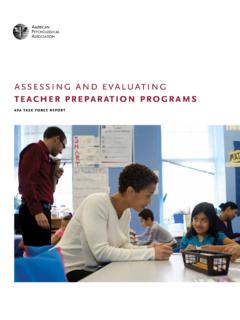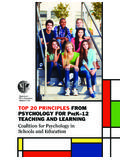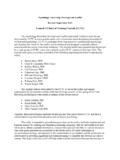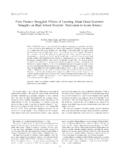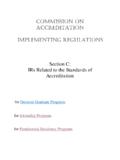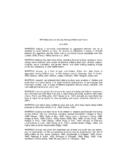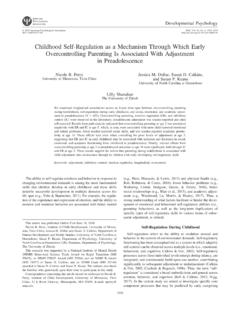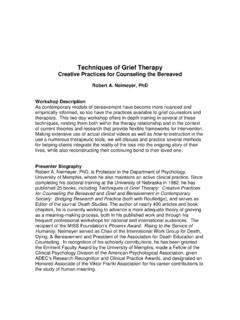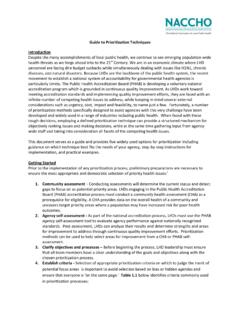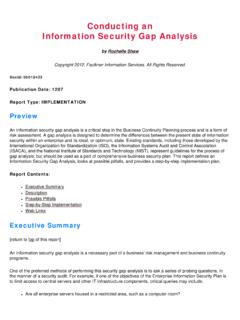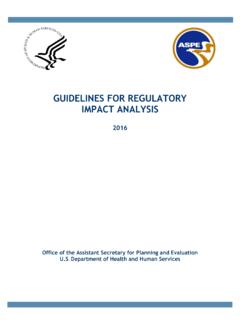Transcription of TESTING AND ASSESSMENT WITH PERSONS & …
1 Council of National Psychological Associations for the Advancement of Ethnic Minority Interests (CNPAAEMI) TESTING AND ASSESSMENT WITH PERSONS & COMMUNITIES OF COLORC ouncil of National Psychological Associations for the Advancement of Ethnic Minority Interests (CNPAAEMI)CNPAAEMI (clockwise from top left):Asian American Psychological AssociationNational Latina/o Psychological AssociationAssociation of Black PsychologistsSociety for the Psychological Study of Culture, Ethnicity and Race (Division 45 of the American Psychological Association)American Psychological AssociationSociety of Indian PsychologistsFrederick T. L. Leong, PhDMichigan State UniversityYong Sue Park, PhDUniversity of Southern CaliforniaCo-EditorsTESTING AND ASSESSMENT WITH PERSONS & COMMUNITIES OF COLORTESTING AND ASSESSMENT WITH PERSONS & COMMUNITIES OF COLORThis monograph was authorized by the Council of National Psychological Associations for the Advancement of Ethnic Minority Interests (CNPAAEMI) and published by the American Psychological Association.
2 Its contents should not be construed as representing the policy of any of the associations represented by CNPAAEMI report is available online at the APA Office of Ethnic Minority Affairs website: bibliographic reference:Council of National Psychological Associations for the Advancement of Ethnic Minority Interests. (2016). TESTING and ASSESSMENT with PERSONS & communities of color. Washington, DC: American Psychological Association. Retrieved from 2016 by the American Psychological Association. This material may be reproduced in whole or in part without fees or permission provided that acknowledgment is given to the American Psychological Association. This material may not be reprinted, translated, or distributed electronically without prior permission in writing from the publisher. For permission, contact APA, Rights and Permissions, 750 First Street, NE, Washington, DC of ContentsPreface ..vI.
3 Introduction ..1 Frederick T . L . Leong, PhD, and Yong Sue Park, PhDII. TESTING and African Americans: TESTING Monograph From the Association of Black Psychologists ..3 Kevin Washington, PhD; Celeste Malone, PhD; Candyce Briggs, PhD; and Gregory Reed, PhDlII. Psychological ASSESSMENT Considerations for American Indians, Alaska Natives, and Native Hawaiians ..12 Jacqueline S . Gray, PhD; Wendy M . K . Peters, PhD; and John A . McCullagh, PhDlV. Psychological TESTING and ASSESSMENT in the Asian American Community ..18 Lisa A . Suzuki, PhD; Philip S . Wong, PhD; and Grace Wong, PhDV. Psychological TESTING and ASSESSMENT of Latina/os ..24 Geneva Reynaga-Abiko, PsyD; Saul G . Alamilla, PhD; Andr s J . Consoli, PhD; and Jes s Aros, PhD vPrefaceThere are five national ethnic minority psychological associations. The presidents (or her/his designee) of these associations and the president (or her/his designee) of the American Psychological Association (APA) constitute the Council of National Psychological Associations for the Advancement of Ethnic Minority Interests (CNPAAEMI): The goals of CNPAAEMI are the following.
4 Promote the professional/career development of ethnic/racial minority psychologists Advance multicultural competence of psychologists Promote culturally competent service delivery models of psychological care Increase the recruitment and retention of ethnic/racial minorities in the profession of psychology Liaise and collaborate with other appropriate organizations interested in ethnic/racial minority issues and/or projects Promote research and understanding using alternative cultural paradigms Authorization of CNPAAEMI activities, such as the development of this report, requires the unanimous consent of all council members. Indeed, this report was developed in response to critical concern among all of the nation s ethnic minority psychological associations about the quality, intensity, and appropriateness of psychological education and training that are being provided to prepare future researchers and service providers to work with the multicultural populations that they will undoubtedly encounter in the 21st century.
5 We hope that this report will encourage psychological trainers and educators to reassess and elaborate on their strategies for preparing the nation s future psychologists to competently and respectfully research and serve the ever-changing tapestry of our increasingly multicultural nation. We hope it will also serve to empower psychology students to seek appropriate multicultural and culture-specific American Psychological AssociationNational Latina/o Psychological AssociationAssociation of Black Psychologists Society of Indian Psychologists American Psychological AssociationSociety for the Psychological Study of Culture, Ethnicity and Race (Division 45 of the American Psychological Association) TESTING AND ASSESSMENT WITH PERSONS & COMMUNITIES OF COLOR1I. INTRODUCTIONI ntroductionFrederick T. L. Leong, PhDMichigan State UniversityYong Sue Park, PhDUniversity of Southern CaliforniaThe monograph on TESTING and ASSESSMENT among racial/ethnic minorities is the fourth in a series of monographs published by the Council of National Psychological Associations for the Advancement of Ethnic Minority Interests (CNPAAEMI) to address diversity issues pertaining to core activities undertaken by psychologists in service of the major racial/ethnic minority populations in the United States.
6 Previous monographs have focused on research (2000), psychological treatment (2003), and education and training (2009). The monograph series is a collective effort among the five major minority psychology organizations: the Asian American Psychological Association (AAPA), Association of Black Psychologists (ABP), National Latina/o Psychological Association (NLPA), Society of Indian Psychologists (SIP), and the Society for the Psychological Study of Culture, Ethnicity and Race of the American Psychological Association (Division 45). TESTING and ASSESSMENT is a unique professional activity undertaken by psychologists in multiple contexts for a wide range of purposes, which include but are not limited to job placement, diagnosing psychological disorders for mental health treatment, verifying health insurance coverage, conducting focus groups for market research, informing legal decisions and government policies, and developing measures to reliably assess personality characteristics (Fisher, 2009).
7 Guidelines for the ethical practice of psychological TESTING and ASSESSMENT with racial/ethnic minorities are provided in the American Psychological Association s (APA) Ethical Principles of Psychologists and Code of Conduct (2002) and the Standards for Education and Psychological TESTING ( TESTING Standards; American Educational Research Association, American Psychological Association, & National Council on Measurement in Education, 2014).According to the Justice Principle of the APA Ethics Code, the field of psychology strives to establish fair and equal access to and benefit of psychological TESTING and assessments for all individuals and populations, including clientele from diverse racial/ethnic backgrounds. The current trends in the racial/ethnic demography of the population suggest that racial/ethnic minorities will progressively represent a larger proportion of the consumer base accessing psychological TESTING and ASSESSMENT services.
8 Thus, attention and sensitivity to issues, as well as resolution of historical and contemporary problems associated with TESTING and ASSESSMENT with racial/ethnic minority populations, is an increasing priority of professional speaking, psychological TESTING and ASSESSMENT with racial/ethnic minority groups have been fraught with controversy. Early perspectives erroneously assumed that psychological tests and assessments were objective, culture-free, and generalizable to racial/ethnic minorities, even though the majority of tests were standardized, validated, and found reliable primarily with White, middle-class, English-language samples (Olmedo, 1981; Reynolds, 1982). Test bias is a primary issue of selecting and using TESTING and ASSESSMENT instruments with racial/ethnic minority groups. Past research has shown that tests can produce misleading results with culturally different groups in terms of slope and intercept (or unfairness) bias.
9 Slope bias occurs when the validity coefficient associated with an instrument used to predict an outcome ( , a job selection measure predicting job performance) is different between groups such that the instrument is more accurate for one group than another. Alternatively, intercept bias occurs when a between-group mean score difference is observed for an instrument used as a predictor, even though both groups are equal on the criterion measure, resulting in the predictor instrument either over- or underpredicting performance on the criterion measure depending on the group (Anastasi & Urbina, 1997).Adding to the controversy of TESTING bias is the manner in which group differences on particular test results have been conceptualized early on in the field of psychology. According to Sue, Arredondo, and McDavis (1992), early researchers applied models of inferiority/pathology and cultural deprivation to interpret group differences on test scores between Whites 2 TESTING AND ASSESSMENT WITH PERSONS & COMMUNITIES OF COLORand racial/ethnic minorities.
10 The Inferiority/Pathology model stipulates that minorities score lower than Whites because they are genetically and biologically deficient ( , lacking the desirable genes to score as high as Whites on particular IQ and achievement tests). The Inferiority/Pathology model was replaced by the Cultural Deprivation model, which blamed the cultural beliefs, values, and practices of minority groups for their lower scores on these tests, with the subtext being that minority cultures are inferior and assimilation into the majority culture is desirable. Both of these models have been scrutinized for their racist undertones and cultural insensitivity, and have now been replaced by the Culturally Different model, which does not view cultural differences between Whites and minorities as an indication of pathology or inferiority of any groups: different is not deficient, different is different. Furthermore, the Culturally Different model views the biculturality of minorities as a strength and desirable quality (Sue et al.)
